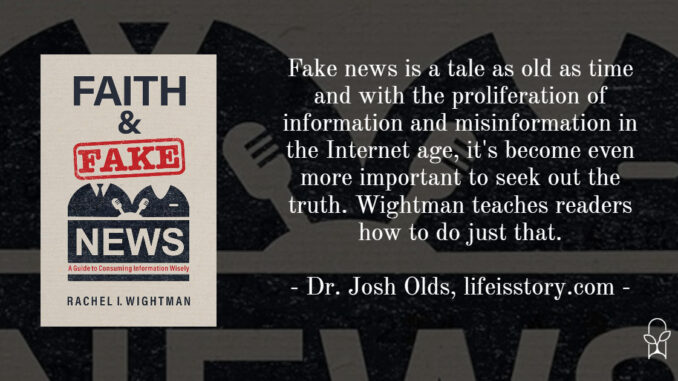
Published by Eerdmans on May 30, 2023
Genres: Non-Fiction, Christian Life, Politics
Buy on Amazon
Goodreads

Share if you love Jesus. Scroll past if you follow the devil. Most Christians have seen something asinine like this on Facebook and rightly dismissed it. But not every post on social media is so obviously absurd. As online spaces increase in importance, it is urgent that we as Christians consider how to love our neighbors on the internet—and this includes sharing the truth. Rachel I. Wightman has seen this problem firsthand as a librarian with over a decade of experience instructing students in information literacy. In Faith and Fake News, she shares her expertise with average Christians. This timely and essential guide explains the information landscape and its tendency toward thought bubbles, discusses techniques for fact-checking and evaluating sources, and offers suggestions on ways to engage with our neighbors online while bearing witness to Christ and the truth.
Fake news is a tale as old as time, but the invention of the Internet and the ability to spread believable (or even unbelievable but emotionally compelling or bias satisfying) misinformation has caused it to skyrocket. Every one of us has certainly seen fake news. Most of us have probably even shared or believed fake news. Even the most cautious aren’t immune. A couple years ago, a respected Ivy League religion professor that I follow on social media posted a news article that didn’t ring true to me. I traced the linked article back to its original source—the satire website Babylon Bee. With misinformation everywhere, how do we know what to trust? Who to trust? How to find reliable information? Those are the questions that librarian and educator Rachel Wightman seeks to answer with Faith and Fake News: A Guide to Consuming Information Wisely.
You might think that the job of librarian is to shush to the loud people and make sure the books are in the right place, but it goes way beyond that. As a librarian, Wightman is trained in the art of research and information sciences. Her professional expertise is in connecting people with information that is relevant, rigorous, and trustworthy for whatever they need. Faith and Fake News is divided into three parts. The first third of the book is an exploration of the information landscape. Wightman talks about how fake news proliferates online, how social media algorithms exacerbate the problem, and what we can do to fight back against it. This is an excellent introduction to people who haven’t ever really thought about why they see the content they do online or haven’t understood how different factors individualize (and thus subjectivize) their Internet experience. Wightman uses non-political and noncontroversial examples to show how it works, then applies that to more contested examples.
The second third takes an introspective turn, teaching us how to evaluate information subjectively (how does this make me feel?) and objectively (what are some markers that make this a reliable resource?). Some of her suggestions feel obvious—but the proliferation and belief in fake news suggests that it isn’t always such. Faith and Fake News teaches readers to not just evaluate the message but also the messenger. How can we determine what websites are reliable? She also talks about understanding biases. When I go to MSNBC and Fox News, these news organizations might both be reliable, but both also have different biases. How one reads a true news story will be affected by the commentary each site provides. Wightman contends that if we acknowledge and understand those biases, we can read and evaluate information more wisely.
The final third of Faith and Fake News talks about what we do in light of the proliferation of fake news and the increase in political and social polarization. As a Christian, for Wightman, it all comes down to “love your neighbor as yourself.” She advocates for grace and understanding, for calm listening and careful criticism. She also advocates for readers to seek out and understand different perspectives. We may not be able to quell the influx of fake news overnight, but reading more wisely and interacting with others more calmly will eventually lead to fake news’s downfall. Fake news thrives on the sensational and feeds on drama, controversy, and online arguments. What if we refused to participate? Wightman, with calmness and clarity, pulls readers out of the culture wars and suggests that a better and healthier type of engagement.
One of the highlights of the book is that it is modeled on Wightman’s class on the intersectionality of faith and misinformation that she began in 2019 in the leadup to the 2020 Presidential election. Wightman includes several practical exercises and ideas that make Faith and Fake News more than theory. I’m a person that’s online more than a lot of people. I pride myself on having a good nose for fake news. Most of what Wightman discusses in the book wasn’t new news to me, but even then her call for what to do different is still compelling. Jesus says “You shall know the truth, and the truth shall set you free.” As Christians we must pursue the truth. Faith and Fake News shows us how to do that.
